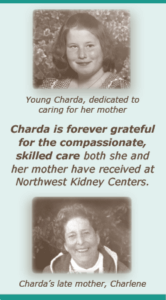Charda Hastings’s life has revolved around kidney care and dialysis in one form or another.
She was just 10 years old when she began helping care for her mom, Charlene Hastings, who had been diagnosed with kidney failure and became one of Northwest Kidney Centers’ first home hemodialysis patients in 1969. The treatment was a huge breakthrough for dialysis patients, allowing them to use a small, more portable machine and dialyze from the comfort of their own home.
To dialyze at home, though, Charlene still needed support – so in stepped Charda. Some of Charda’s earliest memories are of helping sterilize needles and tubing, essential components of the home hemodialysis process. “It was my duty to keep her alive and my whole life, I took that on,” said Charda. “As a little kid, I remember telling my teachers, ‘Well, I have to go home now, because it’s time to take my mom off the machine.’”

By the time she finished her junior year at Ballard High School in Seattle, Charda had completed all her credits, and began attending community college to start classes in nursing. She realized she already had all the training and experience needed for a career in kidney care, so it was the perfect fit for her.
Charda’s first dialysis job was at Northwest Kidney Centers’ Broadway clinic, cleaning dialysis machines.
She eventually became a patient representative at the Scribner Clinic and made a huge impact during her short time there. She helped raise money for the clinic in 1989 and helped get other donations like a popcorn machine and even a car for the clinic.
While she loved working for Northwest Kidney Centers, she left and moved to Oregon in 1989, shortly after her mother passed away. After caring for her mother most of her life, Charda needed the time away to recover mentally and emotionally. But it was a brief respite – Charda soon realized her kidneys were failing and she would need to start dialysis.
Charda was diagnosed with kidney disease when she was 12 but she didn’t have severe symptoms until years later. The issue was, Charda had to move back to Washington to do her dialysis. Dr. Henry Tenckhoff who had previously helped give care to Charda’s mother back in 1962, heard of Charda’s situation, reached out and helped arrange a place for her to stay.
“Henry’s act of kindness meant the world to me. He took the time to help me find a home and get settled, which allowed me to stabilize my life,” said Charda. “I am forever grateful for his thoughtfulness.”
The transition from caregiver to patient was an adjustment for Charda. When she was growing up taking take care of her mom it felt more natural and routine. When she started dialysis herself, the reality of the situation hit, and she says it felt more like an illness for the first time in her life.
Besides dialysis, Charda also met regularly with the Northwest Kidney Centers palliative care team. Palliative care is specialized care for people with serious illnesses, and focuses on minimizing pain, symptoms and stress. The goal is to improve patients’ quality of life by treating the whole person and not just the illness – addressing the emotional, spiritual, and psychological sides of disease.
“Dialysis has been part of Charda’s life since childhood – it’s had a profound impact on her, and she has a unique generational legacy with Northwest Kidney Centers,” says Palliative Care Supervisor Megan Nolan. “Our team has been inspired to walk alongside her and witness how she faced the ups and downs in life with courage.”
The team met with her often to check in and support Charda. She knew she was approaching the end of her life, and it was extremely important for her to have the palliative care team there for support.
“I’ve trusted Northwest Kidney Centers for over 40 years,” said Charda. “My life has kind of come full circle, from caring for my mom to being on dialysis myself. And NKC has been a cherished part of my journey.”
Sadly, Charda passed away shortly after midnight on January 20th, 2024. With the help of the Palliative Care team, Charda was able to see her closest friends one last time.
In reflecting on how dialysis has been woven into the fabric of Charda’s life since childhood, “it has been essential for our team to remember what a profound impact dialysis has had on her identity development and family relationships,” says Palliative Care social worker Jennifer Christophel Lichti. “We hope that sharing her story in this way might shine a light on her unique generational legacy and continue inspiring others in the dialysis community.”
Though her battle with kidney disease has ended, her legacy lives on. Her mother, Charlene, is featured in Northwest Kidney Center’s new Dialysis Museum and will be seen by staff and the public every day. And Charda was happy to share her story – one of resilience, determination, hope, and strength – to inspire other patients facing kidney failure.
“As someone who has faced this situation many times before,” Charda said, “I want to reassure others that they can make it through as well.”
